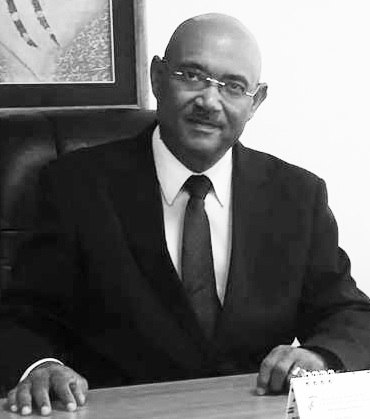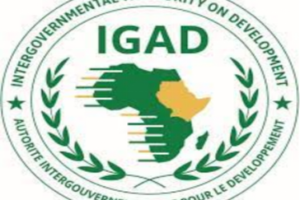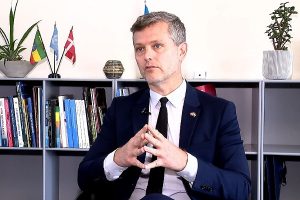
The government has been announcing that local investors could obtain qualified privilege in the spheres of trade and investment through incentives such as tax exemption and facilitation of industrial inputs.
And the government is doing its level best in the protection of the infant domestic industries not to be swallowed by the giant companies. Nevertheless, the policies seem paper tiger ones. In this regard, The Ethiopian Herald had approached the reputable and brand Augusta Garment Share Company’s Deputy General Manager- Asrat Aduye.
Herald: Historically, Augusta had a reputable brand name. Could you brief us about that?
Asrat: The garment Company was established by three Italians. Then the Derg regime confiscated it as a public property. After the company served for long time as a public property, EPRDF owned it.
Then it was privatized .Soon another Italians owned it until 2016. After that, the Italian owners sold the company for indigenous private owners. Meanwhile, it changed its name from Augusta to Addis Garment Industry.
Until now, the company has brand name and reputation in producing quality and preferable shirts. It also produces workers’ uniforms and graduation gowns. On the average, not less than 1,700 shirts are produced per day. As you know, August has been a big brand name.
The quality of the production makes it stand tall before both governmental and private institutions. In coming up with garments the company has a 53 years working experience.
Herald: Is your company involved in export-driven economy?
Asrat: Previously, it was exporting products. After it was transferred to local investors, the company is attempting to penetrate into the global market. But we highly focus on selling our products to the domestic market.
Herald: What are the challenges besetting the company?
Asrat: Many are the challenges we face. Among the challenges, the formidable one is the absence of a company that produces textile products accessible for garment producer companies. Therefore, we are forced to import textile inputs from China. Secondly, we also import accessories. Thirdly, there is a dearth of hard currency. This hamstrung our move of bringing accessories and raw materials from abroad. Fourth, it is costly importing the textile materials and then producing the garment.
Herald: How do you assess market opportunity at national level?
Asrat : Though there is a huge market opportunity at local level, we are not yet forging market linkages with pertinent bodies. We are attempting to contact and to keep in touch with embassies, diplomats and foreigners to widen market opportunities and accessibility. There is a ray of hope on the horizon regarding market opportunities. However, it is not yet translated into practice. The foreign company owners approach and ask us to working with them.But the idea it is not yet realized.
Herald: Are there organizations which support the company?
Asrat : GTZ, ILO and a Netherland’s organization are supporting us to create market linkages outside the country. The company is doing its level best to export its products. However, we have not actualized this yet.
Herald: Would you say something on the quality of the garments the company is producing?
Asrat: We produce quality shirts. Due to this, potential buyers come to our office and sign business notes to distribute our products without bargaining about the quality of the garments. We have specialized and have reputation on drawing lines on clothes before cutting them and tailoring them.
Using standardized management system which lures potential buyers it tries to upgrade the company’s products coming up with quality garment. As Augusta has a long time experience in exporting its products to other countries, we deliver quality shirts for whole retailers.
As our employees are actively engaged in and aspires to come up with quality garment products, our products stands shoulder high in the sight of the potential buyers. As a result, product and productivity are increasing from time to time.
When it comes to middle management level, gap in sufficient skilled man power is conspicuous. Taking this into consideration and struggling to improve the quality of the company’s products, the company is working hard to address this shortage of skilled man powers by hiring Bahar Dar University’s design engineering graduates.
Herald: Which kind of garment product preferable in the eyes of potential buyers?
Asrat: Reaching an agreement with potential buyers, we prepare shirt products either it contains 100 percent cotton or Polyester cotton. But most of the potential buyers prefer to buy polyester comprising products. Most of the time, we sell out products to whole-retailers on the basis of what they requested for. Among other potential buyers, the Commercial Bank of Ethiopia, Airport Enterprises and Beshiftu Motorization Firm allow us to produce for them garments based upon our agreements and the requested formality.
Herald: How do you intend to tackle the challenges?
Asrat: Although there is no problem regarding the local market, there is a problem regarding bringing import-substitution products. In comparison to foreign investors, we are competitive enough to win the local market because of having fruitful and productive workers.
As I mentioned before, the big challenge is in not having enough inputs for garment industries. Hard currency, accessories and raw material are some of the hurdles confronting the company. In order to troubleshoot the challenges, we have a long term plan to work on the expansion of the company. We launch structural framework to deal on the expansion task. As the expansion project takes million dollars bargaining with banks is the only means to realize the respective project.
Herald: How do you evaluate the garment companies here in this country?
Asrat: Here in the country, there are more than 150 garment companies. So these companies are forced to import raw materials. Again and again, we are trying to persuade the government to set up private owned companies, which ensure the production of accessories and raw materials.
Herald: How do you see the government’s role in enthusing domestic investors?
Asrat: I believe instead of attracting foreign investors aiming at finishing garment products, it would be a farsighted measure to attract foreign investors which could produce industrial inputs. Such a bent could contribute a lot to stimulate the garment industries to involve in export-oriented market.
Even the foreign investors, who are eligible to knock at the door of industrial parks, produce garment products instead of producing raw materials and accessories. Producing textile inputs and accessories afford relief and fill the gaps in import substitutions.
It also allows the creation of market linkages between the industrial input producers and garment producers group. Unless industrial input producers are established, it is unthinkable to be progressive and competitive in the global market. The government accords a preferential treatment and select the foreign investors who show willingness to produce accessories and raw materials that feed the respective local garment industries.
In this regard, the government has enunciated that garment and textile, hides and skins as national priority areas. Due to the absence of accessories and raw material industry plants, it is impossible to produce trousers for export market.
Herald: Do you have any tools in winning external and situational constraints?
Asrat: The Company has been exerting its maximum effort to optimize things through engaging aggressively and accelerating the effort of the workers to boost product and productivity. Frequent outages of electricity has recently become a setback to company’s profitability.
When we bring raw materials, there is some sort of exemption. The government allows us tax exemption when we bring accessories and raw materials. But, like sugar factory, the government must show its readiness to build Textile and Garment Industrial Input Enterprise to fill the supply in accessories and raw materials. We have a plan to handle the expansion assignment .We have more than 350 employees.
Through utilizing import subs titution mechanism, we are able to save foreign currency. In fact we have old machineries installed at the time of the first Italian owners. We are in the process to import high-tech machines by striking a deal with Banks.
Ethiopian Development Bank has promised to lend us money to replace the old machines with new ones. We are still expecting foreign currency from commercial bank to import raw materials. Of course, the government helps us a lot to bring accessories from abroad with tax exemption.
Herald: What is your take on domestic investors’ competition?
Asrat: Though there is a wide range of market opportunities, the local investors are not that much in competitive moods. Because of the small number of garment producing firms, it is unthinkable to witness a cut-throat competition.
For instance, India, Bangladesh, China have more than 5,000 garment factories in a single town of their respective country. But here, at national level there are not more than 200 garment industries. Even if the Foreign Direct Investment (FDI) contributes a lot for the development of the country, discouraging and neglecting the local investors is not sagacious. Without embracing local investors, it is unintelligent to try to be progressive.
Herald: At last, do you have anything to add?
Asrat: The second minimum development goal, gives priority for textile and garment industry. Here in this country; we have few textile producing factories. Most of the factories that come up with garment products are owned by domestic investors. In this regard, the government must strengthen the garment industries in various aspects.
Creating market linkage between the foreign investors and local ones is an encouraging trend for the betterment and development of the garment industries.
Those foreign investors, entering into the industrial zones, are not supporting the local-based garment producing firms. In general, there is no market chain. If the government manages to create market linkage between the foreign and domestic garment produced groups, it ensures a great opportunity to fetch foreign exchange. It as well creates opportunities for getting valuable experiences and technology transfer for the local investors
The Ethiopian Herald June 16/2019
BY MEHARI BEYENE





